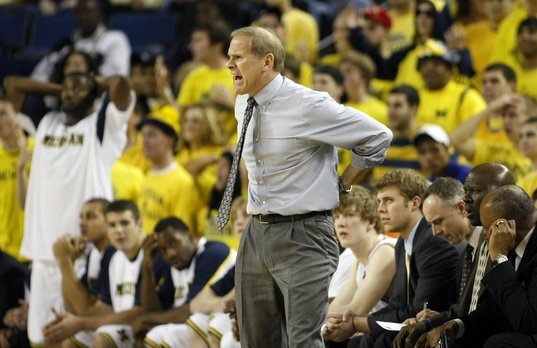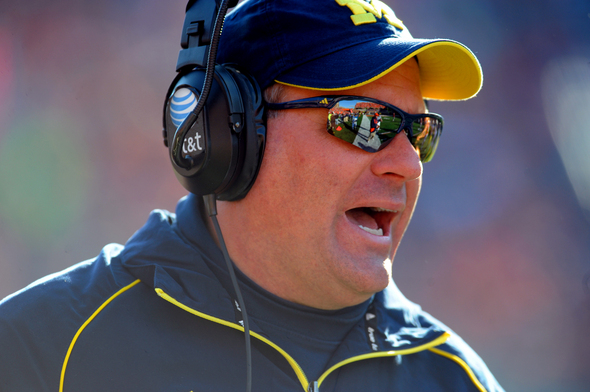It had been some time since a film had created the kind of mass battle effects that Braveheart displayed and which have now become virtually routine in historical and fantasy films (or those that combine the two, like this one.) On the one hand, that generated some veracity street cred right away. Gibson showed the effects of mass combat, morale, the chaos that frequently embodied such events in the Middle Ages (as opposed to ancient combats involving Roman armies; let's not get started on the idiocy of Gladiator...), and the rather brutal results. On the other hand, it was the history of the battles themselves where the movie most often went awry.
First off, the Scots didn't win any fights on an open field, precisely because of the threat of heavy cavalry and the always superior numbers of their southern oppressors. The initial battle of the film, referred to as "Stirling" was actually that of Stirling Bridge, wherein the Scots hung out on the opposite side of the bridge from the English until the latter crossed, piecemeal, and began forming up their lines. Like any good guerrilla commander, Wallace chose that moment to defy propriety and decided not to let the superior force get good and ready. Pushed up against the river, the English scattered and fled. As much as it might have made good cinema for Gibson to suggest that the Scots had developed one of the two key elements that reduced the power of the mounted knight (pike formations, most famously wielded by the Swiss; the other being gunpowder), it's a bit hard to swallow, given that word about those kinds of things does tend to get around. Yes, I realize that the English didn't realize the Renaissance was happening until a century after it was over, but stories about things like military surprises not only travel but tend to grow in the telling, as opposed to tales of Italian paintings. Suggesting that such a dramatic victory could have occurred and not been recorded by someone (especially, say, those Irish monks who "saved" Western civilization) is testing the limits of reason pretty hard.
Or is it?
History, as they say, is written by the winners. This is the central conceit of Gibson's film, in that it purports to give the "true" story of William Wallace that was covered up by the English for centuries in order to prevent the inspiration of the Scottish people. Consequently, massive victories by Wallace were supposedly changed in the historical record to make him seem like more of a bandit than a wartime hero. Of course, one person's bandit is often another's wartime hero and there's no shortage of situations in which the above maxim about the historical record is plainly obvious. Take the War of the Pacific in the 40s. It's almost universally presented as a war of response to unfounded Japanese aggression and it's certainly true that the martial character of the post-shogunate Japanese state certainly encouraged that kind of aggression. However, what drew Japan into conflict with the United States (against its greatest admiral's inclination, but not dramatized and dire warnings) was the fact that the latter was conducting a trade war against a nation that has always been desperate for natural resources, in addition to sovereignty-violating impositions like the Washington Naval Treaty of 1922. Few people talk about that because its easier to simply imagine that the Japanese were evil.
So, is it beyond the realm of reason to think that Wallace's time on earth may have been closer to Gibson's Hollywood version? No, it's not. But it's still pretty unlikely. To his credit, Gibson has never said anything about the film other than it made a great story. He also deserves credit for one of the greatest Oscar quotes ever made. But what really makes the film interesting is the impact that its fantastical story had on Scottish culture and the national attitude, in general. Following the film's release, there was an upsurge in Scottish nationalism and greater discussion of national identity. The Scots began pressing London to fulfill longstanding promises for greater autonomy. This was the final leg being kicked from the stool of the British Empire and it was caused by a movie. Said movie also resulted in the only extant statue of Mel Gibson known to exist:
I mean, sure, it's supposed to be William Wallace but, uh, I got news for you: among the many, many historical errors or outright fantasies presented in the film, one of the most prominent is that they had men running around in skirts. Kilts are a 19th-century faux "tradition" that supposedly hearkens back to the days of the Picts. It was created during another surge of Scottish nationalism that didn't make it very far. During the time of Wallace, men mostly wore what they wear now: jorts.
Or pants, actually. Even the title of the film actually referred to Robert the Bruce, who's presented as a conflicted bad guy that has to learn about leadership from Wallace.
Interestingly, that same Scottish nationalism is so obvious to most that pay attention to politics on the other side of the pond and/or the EPL that it struck me as utterly distorted in the latest James Bond film, Skyfall. While it was a generally good Bond film and was the proper follow-up to Casino Royale in place of the utterly forgettable Quantum of Solace, at one point, they're ostensibly testing Bond's mental state and decide to do some word association. The doctor says "Country" and Bond responds with "England." First off, as an officer of MI6, he's serving the crown or Great Britain, not England. Furthermore, the second half of the film is spent emphasizing Bond's origins... in Scotland. I think it's a pretty safe bet that no Scot would respond with "England" to any word association trigger other than "Detestable."
 |
| What many Scots would gladly do to Windsor Castle |
although, again, it's mildly ridiculous that they refer to Edward as "a cruel pagan", given that he was not only Christian but participated in the Crusades. If they really wanted to emphasize how cruel he supposedly was, they'd have shown him breaking the will of the Welsh where, in at least one instance, he refused the surrender of a Welsh castle in order to test out his new toy from the Continent: a trebuchet. But no one can pronounce the names of any Welsh national heroes, so...










